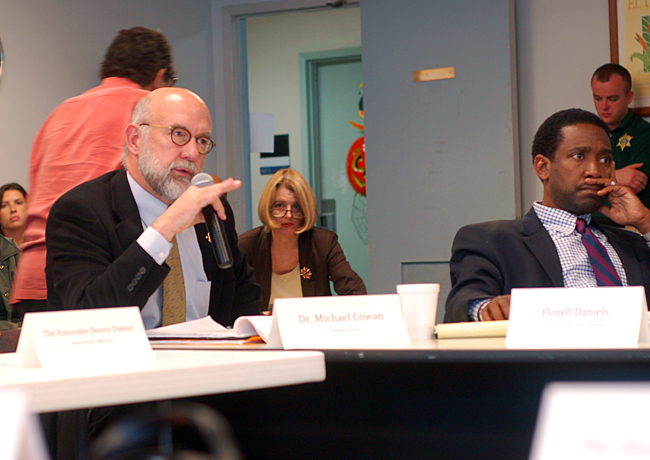
By Matt Davis, The Lens staff writer |
The U.S. Department of Justice is in discussions that will place the Orleans Parish Sheriff’s Office under federal supervision, Loyola Professor Michael Cowan said Monday.
“It’s my understanding that the Department of Justice has been in negotiations with the sheriff’s office and that it is likely that those negotiations will result in a consent decree,” said Cowan, a member of Mayor Mitch Landrieu’s working group seeking to determine the proper size of a rebuilt Orleans Parish Prison.
A consent decree is employed as an alternative to litigation — Orleans Parish Sheriff Marlin Gusman would agree to change certain conditions in his jail in exchange for the Department of Justice dropping a threatened lawsuit against him.
The department first threatened Gusman with such a lawsuit in September 2009, asking him to make improvements in the administration of medications and inmate safety, including taking steps to suppress brutality by guards.
Since then, Gusman has made some policy changes but conditions in his jail continue to draw close scrutiny from civil rights attorneys and criminal justice reform advocates.
Putting the Sheriff’s Office under federal oversight would parallel measures taken earlier this year by the Department of Justice to reform the New Orleans Police Department. The Landrieu administration said it invited the DOJ intervention as part of its own effort to clean up the department.
In anticipation of a federal consent decree, Cowan said Monday that the working group needs to be ready to take input from the Department of Justice when it comes to making recommendations for adequate mental health facilities within the new jail.
“We should, in any way we can, inform ourselves about what requirements there are likely to be from the DOJ in terms of the consent decree that’s coming,” Cowan said.
His remarks drew no obvious reaction from Gusman or other members of the working group.
Asked after the meeting to expand on his reference to the consent decree, Cowan said that he is trying to get details from the Department of Justice. “I have queried the DOJ twice on this and they have told me that there is nothing they can say as the work is ongoing.”
In a September interview, Gusman told The Lens that the DOJ’s 2009 report was “just insulting, and so incomplete, so ridiculous it was insulting.”
Gusman said the report focused on problems that surfaced in the jail in the aftermath of Hurricane Katrina and that all of the problems have since been fixed.
The Lens subsequently requested a series of documents from Gusman’s office that might indicate whether he had made the various policy changes required by the federal investigators. In October, Gusman turned over a series of documents on various issues such as the classification of inmates, use of force, pharmaceutical and mental health operations and suicide prevention.
Eight months later, Gusman’s attorneys asserted that in fact it was still resisting many of the DOJ’s findings and had not implemented its recommendations. “We note that the Sheriff’s Office has made clear that it takes issue with many of the purported findings and proposed recommendations. Because no ‘remedial measures’ have been agreed upon or required as yet in this ongoing process, no ‘compliance’ issues have arisen and there can be no ‘compliance’ records,” attorneys for the Sheriff’s Office wrote in a letter to The Lens.
Speaking at a press conference to release a report on the New Orleans Police Department in March, the head of the Department of Justice’s Civil Rights Division, Assistant Attorney General Thomas E. Perez, denied that his office has let up on Gusman to reform operations at the prison.
“We did issue a letter of findings and we continue to work with all the stakeholders here to address those issues and again that will be part of a long-term sustainability path and there are a lot of very critical questions that need to be resolved, the size of the jail, things of that nature,” Perez said. “And we continue to work collaboratively with people and we are reaching out to community stakeholders to ask: ‘You’ve seen this report now, you understand the jail situation, and what do you think?’ ”
The Department of Justice declined to release records related to its negotiations with Gusman, because they are ongoing.
The mayor’s working jail group at its next meeting is scheduled to release its recommendation on the proper number of beds in the post-Katrina jail now under construction.
The group originally was to have made its recommendation last November, but instead of setting a cap, it recommended that the City Council let Gusman move ahead with a new 1,438-bed intake and processing facility and close most other facilities. The group then planned to spend several more months on other details before recommending the total number of beds.
The group, which has met sporadically over recent months, gathered on Monday to discuss substance abuse, mental health, and the development of a pre-trial service system that could potentially save $3.5 million a year for the city by reducing the number of inmates languishing in Gusman’s jail who are not a flight or safety risk.
The next meeting of the group has not been scheduled.
Here is a video clip of Cowan’s comments at the committee courtesy of the New Orleans Coalition on Open Governance:
